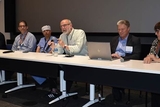
The Third Annual Lymphatic Disorder Conference, held at Children's Hospital of Philadelphia (CHOP) on Friday, June 2, was a resounding success with nearly 100 participants and presenters from around the globe, including countries such as Denmark and Belgium. Attended by leading experts, researchers, clinicians and patient advocates, the conference provided a platform for innovation, collaboration and thoughtful discussions in the field of lymphatic disorders.
Attendees engaged in panel discussions and presentations about different subspecialties and organ systems with a focus on the lymphatic system to gain a better understanding about diagnosing and treating these complex conditions. Topics included imaging of the lymphatic system, surgical management, ocular lymphatics, lymphatics in GI diseases, lymphatic involvement in human disease in the brain and lymphatics in kidney health and disease.
Presentations of note
“Landmarks and Progress in Lymphatic Systemomics” by Marlys H Witte, MD (University of Arizona College of Medicine), which outlined progress in lymphology practice and treatment from the past to the present day.
“Lymphatic Dysfunction and Pulmonary Disease” by Sanjeev Datar, MD, PhD (University of California, San Francisco), which discussed pulmonary lymphatic dysfunction in congenital heart disease with increased pulmonary blood flow.
“Lymphatics: A Potential Target in Immunological Diseases” by Laura Vella, MD, PhD (CHOP), which focused on lymphatic interventions to study immune cell trafficking.
“Advances in Peripheral Lymphatic Identification, Pathophysiology and Therapeutic Options” by Guido Giacalone, MD, PhD (Sint-Maarten Hospital, Mechelen, Belgium)
Conference highlights
Multidisciplinary Approach: The conference emphasized the importance of a multidisciplinary approach to lymphatic disorders. Experts from various specialties, including neurology, surgery, pulmonology, ocular lymphatics, nephrology, immunology, radiology, genetics and cardiology came together to exchange ideas and present their research findings and clinical knowledge. This collaborative effort fostered a comprehensive understanding of lymphatic disorders and paved the way for improved patient care and outcomes.
Cutting-Edge Research: The conference showcased the latest advancements in lymphatic disorder research. Prominent researchers presented groundbreaking studies, shedding light on the underlying mechanisms, genetic factors and novel treatment strategies.
Global Collaboration: The conference fostered international collaboration among experts in the field of lymphatic disorders. Researchers from different countries shared their experiences and challenges, facilitating the exchange of knowledge and expertise. This collaborative spirit bodes well for future advancements in the diagnosis and treatment of lymphatic disorders worldwide.
Key conference takeaways
- Collaboration among various specialties is crucial for comprehensive management of lymphatic disorders.
- Continued research efforts are essential to uncover the underlying mechanisms of lymphatic disorders and develop innovative treatment strategies.
- Patient-centered care, with an emphasis on patient empowerment, should be at the forefront of clinical practice and research.
- Advanced imaging technologies hold immense potential in the diagnosis, monitoring and treatment planning for lymphatic disorders.
- National and international collaboration is key to advancing our understanding of lymphatic disorders and improving patient outcomes worldwide.
- A sustained emphasis on studying and advancing interventional techniques is paramount to improving future patient outcomes.
Featured in this article
Specialties & Programs
The Third Annual Lymphatic Disorder Conference, held at Children's Hospital of Philadelphia (CHOP) on Friday, June 2, was a resounding success with nearly 100 participants and presenters from around the globe, including countries such as Denmark and Belgium. Attended by leading experts, researchers, clinicians and patient advocates, the conference provided a platform for innovation, collaboration and thoughtful discussions in the field of lymphatic disorders.
Attendees engaged in panel discussions and presentations about different subspecialties and organ systems with a focus on the lymphatic system to gain a better understanding about diagnosing and treating these complex conditions. Topics included imaging of the lymphatic system, surgical management, ocular lymphatics, lymphatics in GI diseases, lymphatic involvement in human disease in the brain and lymphatics in kidney health and disease.
Presentations of note
“Landmarks and Progress in Lymphatic Systemomics” by Marlys H Witte, MD (University of Arizona College of Medicine), which outlined progress in lymphology practice and treatment from the past to the present day.
“Lymphatic Dysfunction and Pulmonary Disease” by Sanjeev Datar, MD, PhD (University of California, San Francisco), which discussed pulmonary lymphatic dysfunction in congenital heart disease with increased pulmonary blood flow.
“Lymphatics: A Potential Target in Immunological Diseases” by Laura Vella, MD, PhD (CHOP), which focused on lymphatic interventions to study immune cell trafficking.
“Advances in Peripheral Lymphatic Identification, Pathophysiology and Therapeutic Options” by Guido Giacalone, MD, PhD (Sint-Maarten Hospital, Mechelen, Belgium)
Conference highlights
Multidisciplinary Approach: The conference emphasized the importance of a multidisciplinary approach to lymphatic disorders. Experts from various specialties, including neurology, surgery, pulmonology, ocular lymphatics, nephrology, immunology, radiology, genetics and cardiology came together to exchange ideas and present their research findings and clinical knowledge. This collaborative effort fostered a comprehensive understanding of lymphatic disorders and paved the way for improved patient care and outcomes.
Cutting-Edge Research: The conference showcased the latest advancements in lymphatic disorder research. Prominent researchers presented groundbreaking studies, shedding light on the underlying mechanisms, genetic factors and novel treatment strategies.
Global Collaboration: The conference fostered international collaboration among experts in the field of lymphatic disorders. Researchers from different countries shared their experiences and challenges, facilitating the exchange of knowledge and expertise. This collaborative spirit bodes well for future advancements in the diagnosis and treatment of lymphatic disorders worldwide.
Key conference takeaways
- Collaboration among various specialties is crucial for comprehensive management of lymphatic disorders.
- Continued research efforts are essential to uncover the underlying mechanisms of lymphatic disorders and develop innovative treatment strategies.
- Patient-centered care, with an emphasis on patient empowerment, should be at the forefront of clinical practice and research.
- Advanced imaging technologies hold immense potential in the diagnosis, monitoring and treatment planning for lymphatic disorders.
- National and international collaboration is key to advancing our understanding of lymphatic disorders and improving patient outcomes worldwide.
- A sustained emphasis on studying and advancing interventional techniques is paramount to improving future patient outcomes.
Contact us
Jill and Mark Fishman Center for Lymphatic Disorders